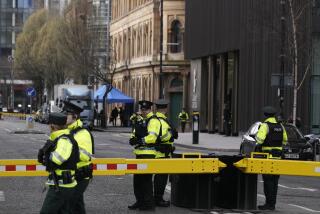Sinn Fein Opens Its First Office in U.S. : N. Ireland: In Washington, leader of IRA’s political wing calls on Britain to end ‘psychology of war.’
- Share via
WASHINGTON — Challenging Britain to relinquish its “psychology of war,” Sinn Fein leader Gerry Adams on Tuesday opened the first office in the United States for the political wing of the Irish Republican Army, long considered a terrorist organization by the U.S. government.
Adams and other Sinn Fein officials said they will use their quarters here to raise money and lobby Congress to press Britain to negotiate with the group, to pull its troops out of Northern Ireland and to permit unification of the divided island.
The opening of a Washington lobbying office, like those maintained by other foreign organizations and governments interested in influencing U.S. policy, reflects the increasing legitimacy of Sinn Fein, long viewed as no more than a front for IRA terrorism.
It follows President Clinton’s effort to offer greater diplomatic and political stature to Sinn Fein and its leaders as a way to encourage a permanent end to violence and continued progress toward peace in Northern Ireland.
But Clinton’s decisions last week to lift travel and fund-raising restrictions on Adams and other Sinn Fein leaders have infuriated the British government, which remains skeptical that the IRA is ready to forswear violence and fears that the U.S. actions could harm the peace process.
The IRA announced in September that it was suspending violent tactics and declaring a cease-fire. But thus far, it has rejected British demands that it give up its weapons.
Earlier this week, on a visit to Jerusalem, British Prime Minister John Major said Sinn Fein is “still directly associated with a fully formed terrorist organization.”
On his first visit to America under his new status, Adams told reporters: “It’s time Mr. Major stopped making excuses and started making peace. He talks an awful lot about Sinn Fein. Why can’t he talk to Sinn Fein?”
British officials conducted their first direct talks with Sinn Fein earlier this year, but the group has requested meetings at a higher level.
Also Tuesday, the British government announced the first significant withdrawal of troops from Northern Ireland in a decade, with a regiment of 400 soldiers returning to England.
“It reflects the improved security situation and is a further step toward normality,” Northern Ireland Secretary Patrick Mayhew said.
In Washington, Adams called the withdrawal a “rather belated response to the IRA’s initiative of almost half a year ago.”
Britain will still have about 17,500 troops in Northern Ireland.
In the 25 years since the British army moved into Northern Ireland in force, 3,000 people have died violently as a result of the conflict between Protestants and Roman Catholics.
Adams urged Major and others in Britain not to count his new status in America as an affront to them, saying, “It’s wrong for anyone in the British Establishment to see this trip, this visit, the opening of this office, as one up for Sinn Fein, one down for the Brits.”
But some Irish Americans who gathered to celebrate the opening of Sinn Fein’s modest quarters said they understand Britain’s concern.
“The British are as much or more concerned about the American Irish as they are about the Irish in Ireland,” said James Clark, president of the District of Columbia board of the Ancient Order of Hibernians in America. “We can influence the U.S. government like they have been doing over the past decades.”
Before he leaves the United States, Adams is expected to attend a $200-a-plate fund-raiser in New York and to shake hands with Clinton at a White House St. Patrick’s Day party.
Meantime, in Northern Ireland’s maximum-security Maze Prison on Tuesday, 50 prison officers were injured, three seriously, and 18 inmates were hurt after Protestant guerrillas rioted, a prison spokesman said.
Daylong disturbances erupted during a routine search operation in an area housing pro-British Ulster Volunteer Force prisoners. About 150 inmates were involved, including many serving long terms for sectarian crimes during the province’s civil war.
Times staff writer William Tuohy in London contributed to this report.
More to Read
Sign up for Essential California
The most important California stories and recommendations in your inbox every morning.
You may occasionally receive promotional content from the Los Angeles Times.













